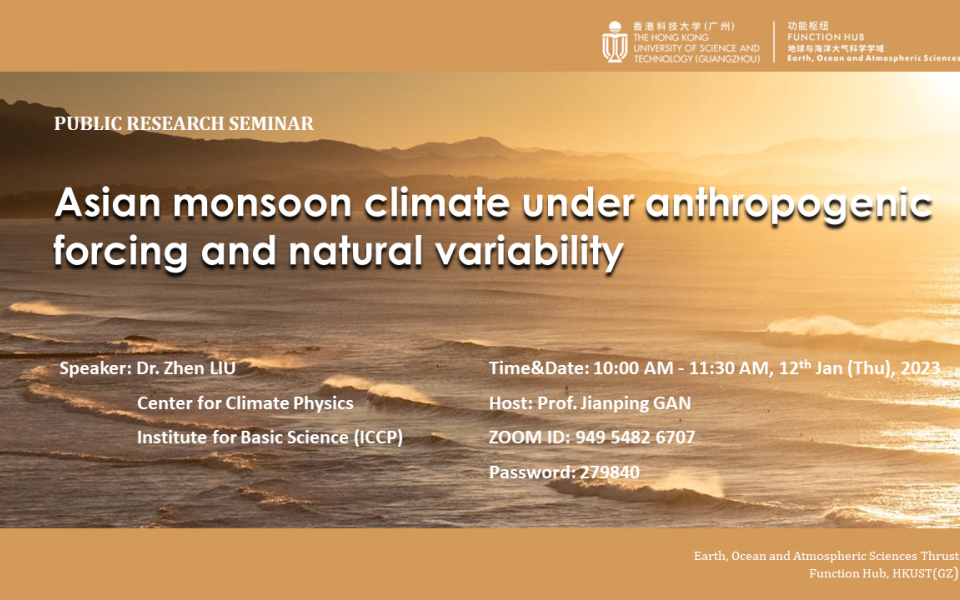Public Research Seminar by Earth, Ocean and Atmospheric Sciences (EOAS) Thrust, Function Hub, HKUST (GZ) - Asian monsoon climate under anthropogenic forcing and natural variability
Supporting the below United Nations Sustainable Development Goals:支持以下聯合國可持續發展目標:支持以下联合国可持续发展目标:
The Asian monsoon is one of the most vibrant components of the global atmospheric circulation system. Its seasonal march is characterized by prominent changes in the large-scale atmospheric circulation across the Indo-Pacific region and beyond. During the summer, the monsoon southerlies bring a hot and wet climate providing water resources for more than 60% of the world’s population, while during the winter northerly winds can lead to cold surges and severe weather. An improved understanding of the influences of anthropogenic forcing and natural variability on monsoon climate and their associated mechanisms can be beneficial to the simulation and interpretation of observed and projected monsoon climate changes.
In this talk, the speaer will first present the monsoon climate responses to anthropogenic aerosols, which represent the largest uncertainty in quantifying the total anthropogenic forcing on climate. The climate model simulation results highlight the underlying physical pathways of aerosols in driving planetary-scale teleconnection patterns via large-scale circulation changes. Later, the role of natural variability in modulating extreme weather and climate events (e.g., heatwaves) will be demonstrated. In particular, the contrasting circulation patterns and underlying physical processes contributing to various types of heatwaves (e.g., dry and humid heatwaves) over southern China will be discussed.
Dr. Zhen Liu is a Postdoctoral Research Fellow at the Center for Climate Physics, Institute for Basic Science (ICCP). He received his Ph.D. degree in 2018 from the Institute of Space and Earth Information Science at The Chinese University of Hong Kong. Before joining ICCP in 2021, he worked as a Postdoctoral Research Associate at the University of Edinburgh. Dr. Liu’s research aims to advance the understanding of the mechanism and physical processes governing both observed and future climate changes across a wide range of spatio-temporal scales. He has devoted most of his efforts to anthropogenic-induced changes in monsoon circulation as well as climate extremes by making use of observations and general circulation models, supported by solid theoretical analyses. The relevant research results have been published in 19 peer-reviewed papers. He also serves as a reviewer for 14 peer-reviewed journals (e.g., Nature) and an editorial board member for Frontiers in Earth Science and Frontiers in Climate.
For enquiries, please contact Miss Mumu Li (+86 020 88332812, mumuli@ust.hk )
